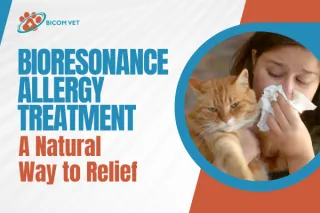
Bioresonance Cancer Treatment: Evaluating the Claims
Explore the concept of bioresonance cancer treatment, its origins, scientific evaluations, and the importance of evidence-based approaches in oncology. ...more
What Vet Says
March 21, 2025•7 min read

Bioresonance Allergy Treatment: Natural Relief That Works
Discover how bioresonance allergy treatment helps reduce symptoms naturally, offering lasting relief without medication. Learn more about this breakthrough therapy. ...more
What Vet Says
March 19, 2025•8 min read

White Cross Vets: Trusted Pet Care Across the UK
White Cross Vets offers top-quality veterinary services across the UK. From preventive care to surgery, we ensure your pet's health and happiness. ...more
What Vet Says
March 17, 2025•8 min read

Pets with Owners: The Unbreakable Bond Explained
Discover how pets with owners develop deep emotional bonds, improve well-being, and create lifelong companionship based on love and trust. ...more
What Vet Says
March 13, 2025•8 min read

Unique Pet and Owner Gifts for Every Special Moment
Discover the best pet and owner gifts that bring joy and strengthen bonds. Thoughtful, unique, and perfect for any occasion. Explore now! ...more
What Vet Says
March 07, 2025•7 min read

Best Gifts for a Pet Owner – Unique and Thoughtful Ideas
Looking for the best gifts for a pet owner? Explore unique, thoughtful, and practical gift ideas that will delight any pet lover and their furry companion. ...more
What Vet Says
March 04, 2025•7 min read
Search Testimonials
It is important to remember that individual anecdotes and testimonials should not be used as the sole basis for making decisions about medical treatments or therapies.
When it comes to alternative therapies like bioresonance, it is essential to rely on evidence-based research and the advice of trained medical professionals. While some people may have positive experiences with bioresonance for their animals, it is important to approach these claims with caution and seek out reliable information from reputable sources.
Ultimately, the decision to pursue bioresonance or any other alternative therapy for your animal should be made in consultation with a veterinarian or animal health professional who can help you weigh the potential benefits and risks.
Pollen – a nuisance for our animal companions too
Hay fever patients are only too familiar with the problem. Year after year the misery begins in the spring with stinging eyes, runny itchy nose and, in severe cases, with a cough and asthma as well. What is perhaps less well known is that our animals too suffer increasingly from this same medical condition.
Just as with humans, the incidence of allergies is also becoming more frequent in animals. Allergic reactions may be provoked by airborne allergens such as pollen, house dust and house dust mites, amongst other factors. Food intolerance is also on the increase, however, and represents a distressing problem for the affected animals.
Now, in spring, as it gets warmer, allergic animals are all suffering as well. With animals it is mainly their skin which itches or else their
noses run more and they occasionally sneeze. Changes in their coats and reddening of the skin are often noticed in the face, feet and ears. These areas often display bloody claw marks and develop into very painful weeping eczema, indicating the severity of the irritation.
This type of problem in animals can be treated with the allergy programs pre-loaded in the Bicom device.
Dr. med. vet. C. May
Quick Links


Facebook
Instagram
Mail